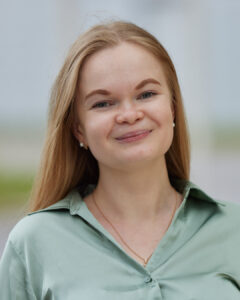Anastasiia Fanova’s Interview
Starting date: 01.12.2022
Nationality : Russian
Implementing Partner : Forschungszentrum Juelich
Main supervisor: Dr. Aurel Radulescu

Few words about you and your research project
I received my PhD in physical chemistry from Charles University in Prague, Czech Republic, where I get specialized on the preparation and characterization assemblies of hydrophilic polymers. Recently I joined the Jülich Center for Neutron Science at MLZ, Garching as a postdoc within the GNeuS project. Along the project I will work in the Soft Matter research group at JCNS under the supervision of Dr. Aurel Radulescu and at our academic secondment – Theoretical and Physical Chemistry Institute Hellenic Research Foundation.
My proposed project is devoted to the preparation and investigation of polysaccharide-based nanogels and microgels obtained as a result of assembly with ionic crosslinking agents. Such systems are of interest as an alternative oil-water emulsion stabilizers and as carriers for various bioactive ingredients for the food sector. The research will involve an advanced small-angle neutron scattering (SANS) and complementary techniques for the comprehensive analysis of the structural, morphological properties and relationship between nanoscopic/mesoscopic structural characteristics and macroscopic functional properties along the wide range of scales. Also, we expect the transfer of the achieved knowledge to a large-scale commercial application with proper adjustment of relevant parameters with the support of industrial secondment HYAD MIKE.
What is your background? How have you heard about GNeuS?
During my PhD project at Charles University, Prague, I worked on the project ‘Self-assemblies based on hydrophilic polymers in aqueous media’. The project was focused on the preparation and characterization of polyelectrolyte-surfactant and interpolyelectrolyte complexes of various morphologies. During the project I attended SAXS and SANS experiments at large scale facilities as a user. Some information about my research is available here.
Since I have attended EUSMI/SoftComp meetings several times I received an information about the GNeuS program from their mailing list. Moreover, my former colleague Dr. Anastasiia Murmiliuk, who is working at JCNS, informed me about the possibility.
Why did you apply specifically on GNeuS?
I applied for the GNeuS call as I wanted to extend my scientific and technological horizon in particular to acquire an expertise in advanced neutron techniques and methodologies for the characterization and application to diverse systems.
Since GNeuS is a well-structured program hosted by world-leading organizations and offering interdisciplinary and intersectoral approach and cooperation with a range of partner organizations including neutron sources, research, academia and industry institutions, it will be beneficial for boosting my career prospective.
What impacts do you expect from the GNeuS fellowship?
From the GNeuS program I expect to expand scientific knowledge and skills for a comprehensive fabrication, characterization and practical implementation of innovative materials and technologies with a main focus on neutron scattering techniques and complementary methods.
As a result of planned activities along the project, I also expect to develop a modern competitive portfolio of skills in both academic and industrial settings as well as to establish new networks with colleagues from various scientific institutions and industrial organizations.
Moreover, I believe that GNeuS fellowship allow me to significantly increase my soft skills, leadership and project management due to the possibility of flexible individual training program.
